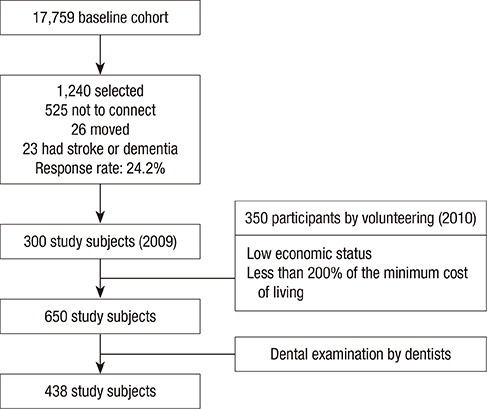J Korean Med Sci.
2013 Oct;28(10):1518-1521. 10.3346/jkms.2013.28.10.1518.
Tooth Loss May Predict Poor Cognitive Function in Community-Dwelling Adults without Dementia or Stroke: The PRESENT Project
- Affiliations
-
- 1Department of Neurology, Wonkwang University School of Medicine, Institute of Wonkwang Clinical Medicine, Iksan, Korea. suksh@wonkwang.ac.kr
- 2Department of Neurology, Wonkwang University Ansan Municipal Geriatric Hospital, Center for Prevention of Stroke and Dementia, Ansan, Korea.
- 3Division of Health and Nutrition Survey, Korea Centers for Disease Control and Prevention, Osong, Korea.
- 4Department of Nursing, Wonkwang University College of Medicine, Iksan, Korea.
- KMID: 1777691
- DOI: http://doi.org/10.3346/jkms.2013.28.10.1518
Abstract
- Periodontal disease is a potential predictor of stroke and cognitive impairment. However, this association is unclear in adults aged 50 yr and above without a history of stroke or dementia. We evaluated the association between the number of teeth lost, indicating periodontal disease, and cognitive impairment in community-dwelling adults without any history of dementia or stroke. Dental examinations were performed on 438 adults older than 50 yr (315 females, mean age 63+/-7.8 yr; 123 males, mean age 61.5+/-8.5 yr) between January 2009 and December 2010. In the unadjusted analysis, odds ratios (OR) of cognitive impairment based on MMSE score were 2.46 (95% CI, 1.38-4.39) and 2.7 (95% CI, 1.57-4.64) for subjects who had lost 6-10 teeth and those who had lost more than 10 teeth, respectively, when compared with subjects who had lost 0-5 teeth. After adjusting for age, education level, hypertension, diabetes, hyperlipidemia, and smoking, the relationship remained significant (OR, 2.0; 95% CI, 1.08-3.69, P=0.027 for those with 6-10 teeth lost; OR, 2.26; 95% CI, 1.27-4.02, P=0.006 for those with more than 10 teeth lost). The number of teeth lost is correlated with cognitive impairment among community-dwelling adults aged 50 and above without any medical history of stroke or dementia.
Keyword
MeSH Terms
Figure
Cited by 1 articles
-
Association between Diabetes and the Use of Removable Dental Prostheses among the Korean Population
Jae-Hyun Lee, Jung-Suk Han, Kyungdo Han, Su-Young Lee
J Korean Med Sci. 2019;34(41):. doi: 10.3346/jkms.2019.34.e262.
Reference
-
1. Korean Statistical Information Service. Statistics Korea;accessed on 5 January 2010. Available at http://www.kosis.kr.2. Stewart R, Hirani V. Dental health and cognitive impairment in an English national survey population. J Am Geriatr Soc. 2007; 55:1410–1414.3. Takata Y, Ansai T, Soh I, Sonoki K, Awano S, Hamasaki T, Yoshida A, Ohsumi T, Toyoshima K, Nishihara T, et al. Cognitive function and number of teeth in a community-dwelling elderly population without dementia. J Oral Rehabil. 2009; 36:808–813.4. Kaye EK, Valencia A, Baba N, Spiro A 3rd, Dietrich T, Garcia RI. Tooth loss and periodontal disease predict poor cognitive function in older men. J Am Geriatr Soc. 2010; 58:713–718.5. Wu B, Plassman BL, Liang J, Wei L. Cognitive function and dental care utilization among community-dwelling older adults. Am J Public Health. 2007; 97:2216–2221.6. Folstein MF, Folstein SE, McHugh PR. "Mini-mental state". a practical method for grading the cognitive state of patients for the clinician. J Psychiatr Res. 1975; 12:189–198.7. Minn YK, Suk SH, Park HY, Cheong JS, Yang HD, Lee SI, Do SY, Kang JS. Tooth loss is associated with brain white matter change and silent infarction among adults without dementia and stroke. J Korean Med Sci. 2013; 28:929–933.8. Kang YW, Na DL, Hahn SH. A validity study on the Korean mini-mental state examination (K-MMSE) in dementia patients. J Korean Neurol Assoc. 1997; 15:300–308.9. Kim JM, Shin IS, Yoon JS, Kim JH, Lee HY. Cut-off score on MMSE-K for screening of dementia in community dwelling old people. J Korean Geriatr Psychiatry. 2001; 5:163–168.10. Grabe HJ, Schwahn C, Völzke H, Spitzer C, Freyberger HJ, John U, Mundt T, Biffar R, Kocher T. Tooth loss and cognitive impairment. J Clin Periodontol. 2009; 36:550–557.11. Kamer AR, Craig RG, Dasanayake AP, Brys M, Glodzik-Sobanska L, de Leon MJ. Inflammation and Alzheimer's disease: possible role of periodontal diseases. Alzheimers Dement. 2008; 4:242–250.12. Li X, Kolltveit KM, Tronstad L, Olsen I. Systemic diseases caused by oral infection. Clin Microbiol Rev. 2000; 13:547–558.13. D'Aiuto F, Ready D, Tonetti MS. Periodontal disease and C-reactive protein-associated cardiovascular risk. J Periodontal Res. 2004; 39:236–241.14. Taylor BA, Tofler GH, Carey HM, Morel-Kopp MC, Philcox S, Carter TR, Elliott MJ, Kull AD, Ward C, Schenck K. Full-mouth tooth extraction lowers systemic inflammatory and thrombotic markers of cardiovascular risk. J Dent Res. 2006; 85:74–78.15. McGeer PL, McGeer EG. The inflammatory response system of brain: implications for therapy of Alzheimer and other neurodegenerative diseases. Brain Res Brain Res Rev. 1995; 21:195–218.16. Finch CE, Crimmins EM. Inflammatory exposure and historical changes in human life-spans. Science. 2004; 305:1736–1739.17. Kim JM, Stewart R, Prince M, Kim SW, Yang SJ, Shin IS, Yoon JS. Dental health, nutritional status and recent-onset dementia in a Korean community population. Int J Geriatr Psychiatry. 2007; 22:850–855.18. Bergdahl M, Habib R, Bergdahl J, Nyberg L, Nilsson LG. Natural teeth and cognitive function in humans. Scand J Psychol. 2007; 48:557–565.19. Engelhart MJ, Geerlings MI, Ruitenberg A, van Swieten JC, Hofman A, Witteman JC, Breteler MM. Dietary intake of antioxidants and risk of Alzheimer disease. JAMA. 2002; 287:3223–3229.20. Morris MC, Evans DA, Bienias JL, Tangney CC, Bennett DA, Aggarwal N, Wilson RS, Scherr PA. Dietary intake of antioxidant nutrients and the risk of incident Alzheimer disease in a biracial community study. JAMA. 2002; 287:3230–3237.
- Full Text Links
- Actions
-
Cited
- CITED
-
- Close
- Share
- Similar articles
-
- Dementia onset among community-dwelling older adults with mild cognitive impairment: A longitudinal study
- Tooth Loss Is Associated with Brain White Matter Change and Silent Infarction among Adults without Dementia and Stroke
- Depression and Cognitive Function of the Community-dwelling Elderly
- Letter to the Editor: Awareness and Understanding of Dementia in Community-Dwelling Adults Without Dementia and Stroke
- The Mediating and Moderating Effects of Types of Internet Use in the Relationship between Age and Cognitive Function among Community-Dwelling Older Adults


